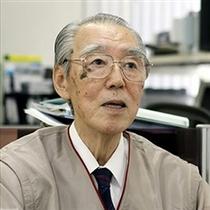'Mr Walkman' hangs up hat as Sony struggles to find new rhythm

Nobutoshi Kihara speaks to AFP during an interview at Sony's affiliated laboratory the Sony Kihara Laboratory in Tokyo. Despite a disastrous few years for the iconic Japanese company, the ground-breaking Sony engineer believes the electronics giant still has its spirit of innovation as it marks its 60th anniversary.
Photograph by : AFP/Yoshikazu Tsuno
Hiroshi Hiyama, AFP
Published: Wednesday, November 01, 2006
Times have changed since Nobutoshi Kihara sketched out designs for the revolutionary Walkman on a piece of paper.
But, despite a disastrous few years for the iconic Japanese company, the ground-breaking Sony engineer believes the electronics giant still has its spirit of innovation as it marks its 60th anniversary this year.
A protege of Sony co-founders Masaru Ibuka and Akio Morita, Kihara is the little known face behind Japan's first magnetic tape recorders, portable tape recorders, music stereo systems, Betamax video and digital cameras.
Kihara, who has slipped quietly into retirement after nearly six decades at Sony, also played key roles in improving the company's televisions and mini video cameras.
"We made good, quality products. Our founders also knew the importance of advertising and promotion. That's how the company grew," said the soft-spoken 80-year-old, dressed in a khaki engineer's uniform.
"We did not think about expanding the company for the sake of expansion. It just grew as we worked on our products," he told AFP before retiring as head of a Sony research center where he spent his last working years.
"Back in my days, we had to draw product designs on papers. I would close my eyes and imagine our products. I would imagine joggers with Walkmans to see how the hinges should move or how the products fit into the lives of the users."
Proud to have been a Sony employee and former student of Ibuka, Kihara said he believes the company's rank-and-file engineers will keep pushing the technological boundaries.
"I am confident that our soul as engineers is being passed on to young people. Being unique and creative -- that's the quality of Sony," he said.
Few would dispute that the original Walkman, which went on sale in 1979, changed the way people around the world listened to music.
Ironically, however, US computer maker Apple trumped Sony in the market for new digital portable music players with its phenomenally successful iPod. Sony has also lagged behind rivals like Panasonic in super-thin televisions.
Sony has gone through a turbulent spell in recent years, including recalls of millions of its laptop computer batteries that have dealt a serious blow to its fragile recovery from a profit slump.
As many as 9.6 million Sony batteries could now be recalled and last week the group slashed its full-year operating profit forecast by 62 percent to 50 billion yen (421 million dollars) -- about one-quarter of last year's levels.
On Thursday it posted a second-quarter loss of 20.8 billion yen.
The troubles have hit Sony just as a painful restructuring drive under its first foreign chief executive Howard Stringer had appeared to be paying off.
Sony's woes are seen by many observers as a sign that the modern Sony -- a sprawling electronics, music and entertainment conglomerate -- is losing the determined engineering spirit of Ibuka its legendary co-founder.
Even Japanese Minister of Economy, Trade and Industry Akira Amari said recently: "As a former employee, I feel like, 'What happened to Sony the technology company?'
"I hope the company will regain its brand strength as Sony the technology company by quickly addressing the technical problems," Amari told reporters.
For years Sony was able to set premium prices for its products against rival electronics firms because of its strong brand image, backed by solid engineering and design finesse.
Some analysts believe Sony's decision to branch out into non-core areas such as finance, as well as cost-cutting efforts and outsourcing of parts manufacturing, have weakened the company's engineering prowess.
Born in 1926, Kihara's career with Sony mirrors the firm's rise from a small electronics workshop to an international conglomerate, as the modern Japan emerged from the ashes of war to become the world's second largest economy.
He grew up tinkering with toys, building radio sets and model trains and aspired to become a mechanical engineer.
After Japan's defeat in World War II, he built and sold radios and other electronics from parts to support his family and to pay for his college education.
It was at that time that Ibuka and his associates founded Tokyo Tsushin Kogyo, or Tokyo Telecommunications Engineering Corp, in 1946 as a small shop researching and making telecommunications and measuring equipment.
The Sony co-founders encouraged their young engineers to experiment and learn from the latest Western inventions.
Nicknamed "a treasure of Sony," Kihara played a key role in developing the technology that resulted in the world's first commercially successful transistor radio in the 1950s.
The success gained Sony international acclaim, which was followed by similar successes in household stereo systems, televisions, video recorders, personal computers and professional use broadcasting equipment.
"I have to think that Lady Luck is watching over me," said Kihara.
"When I needed advice, I felt as if someone was guiding me to certain studies or books with hints and answers," he said.
Sony experienced a massive corporate defeat in the battle that erupted in the late 1970s between two types of video cassettes.
Kihara has written in his books that it still boiled his blood to think that consumers have been forced to use the "inferior" VHS over Sony's Betamax.
Sony is preparing for a similar fight now in new high-definition DVDs.
"It's very difficult to make technological advances, however small they may be. People may not know our story -- how we spent money, how we failed, how we had to re-do our work," he said.
"Technological progress ends once we start imitating others."
© AFP 2006

0 Comments:
Post a Comment
<< Home